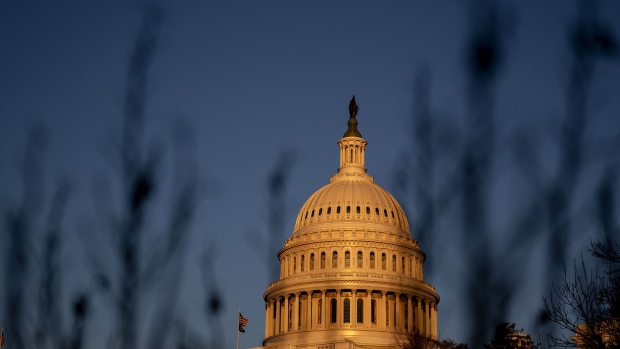Jan 3, 2021
Why January 6 Is a Key Date for Trump’s Election Gripes
, Bloomberg News

(Bloomberg) -- The voters have spoken. So have the electors who, under America’s unique system, have the official job of choosing the next president. The U.S. Congress still has a role to play, one that’s usually mostly ceremonial, but this time around could mark one last attempt by loyalists to President Donald Trump to overturn the election of President-elect Joe Biden.
1. What is Congress’s role?
On Jan. 6, the Senate and House meet jointly to open and count certificates of electoral votes from the 50 states and the District of Columbia, in alphabetical order. The process is spelled out in great detail in the U.S. legal code, right down to the Jan. 6 date and the hour (1 p.m.) at which the joint session begins. The candidate who reaches 270 electoral votes is the winner. During the session, at which Vice President Mike Pence will preside, any member may object to the results from any individual state.
2. What might happen this time?
At least two House Republicans have said they either plan to make an objection to the declaration or that they support such an effort -- Mo Brooks of Alabama and incoming freshman Marjorie Taylor Greene of Georgia. Asked in a Dec. 9 C-SPAN interview which state electors he plans to challenge, Brooks replied, “Well I’m not limiting myself, but by way of example, Pennsylvania, Georgia, Nevada, Wisconsin, maybe Arizona.” The question is whether any senator will take up the cause. If no senator does, then the process stalls out before it can even begin.
3. Will a senator go along?
That seemed unclear until Senator Josh Hawley, a Missouri Republican, announced on Dec. 30 that he would raise an objection as well, mentioning Pennsylvania as one state whose election procedures troubled him. Senate Majority Leader Mitch McConnell had urged fellow Republicans not to object, saying it could hurt the party politically. Pence, as the presiding officer, could find himself in the awkward position of having to gavel down objections raised by supporters who would like nothing more than to keep him in office as vice president.
4. What happens if a representative and senator file an objection?
The joint session immediately recesses before the next state is called, and the House and Senate meet separately to debate the objection for up to two hours before voting on whether to count or discard the electoral votes in question. Only if the objection is approved by both houses would votes be excluded. With a Democratic majority in the House, and several Republican senators on record opposing Trump’s attempts to overturn Biden’s win, any objection would be highly unlikely to succeed in getting electoral votes thrown out. But if separate two-hour debates are required for multiple states, the process could be a drawn-out affair.
5. Have objections been raised before?
Actually, objections aren’t rare during this process, but usually they are disposed of quickly and easily. After the 2016 election won by Trump, for instance, several Democratic representatives attempted to challenge electoral votes, but no senator joined them. In 2005, following the contest between George W. Bush and John Kerry, a group of Democrats in Congress objected to the electoral votes from Ohio. In that instance, both Ohio Representative Stephanie Tubbs Jones and California Senator Barbara Boxer filed the objection, prompting consideration by both chambers. The challenge was rejected by votes of 267-31 by the House and 74-1 by the Senate.
6. Has Congress ever rejected votes?
In 1873, Congress decided not to count votes from Arkansas and Louisiana in the re-election of President Ulysses S. Grant, though Grant would have been the victor either way, according to the Congressional Research Service. Four years later, in 1877, a joint session of Congress confronting competing slates of electors opted to create a bipartisan electoral commission to resolve the highly disputed election between Democrat Samuel Tilden and Republican Rutherford B. Hayes, who ended up winning by a single electoral vote. In hopes of avoiding such a situation in the future, Congress passed the Electoral College Act of 1887, which formed the basis for the current law. There have been no cases to date in which the process has changed the outcome of an election, according to the Congressional Research Service.
©2020 Bloomberg L.P.